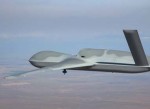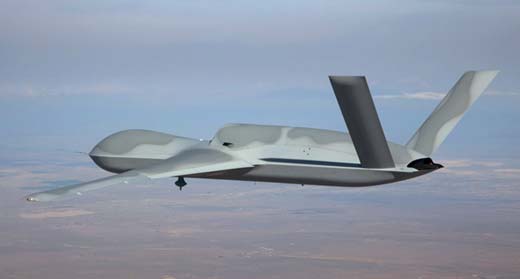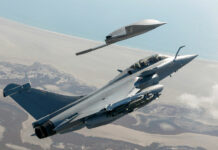
The U.S. Air force has awarded General Atomics a contract to build a third prototype of the stealthy Predator C Avenger unmanned aircraft. General Atomics has already built two such aircraft and is planning to build two more, at least one is now being funded by the U.S. Government. According to David A. Fulghum of Aviation Week, these new ‘Avenger’ versions will be more powerful and will carry more payloads than the first two prototype competed in 2009. A second Avenger flew for the first time in April 2010. The Air Force has allocated $15 million for the first aircraft but the program is expected to grow in size.
General Atomics informed the Air Force it is ready to quickly ramp up production if the Air Force or other government agencies will order more planes. The procurement is overseen by the U.S. Air Force’s secretive Big Safari, a special, rapid-acquisition organization.
The Air Force plans to send this aircraft to Afghanistan, where it will be used for evaluation of ‘next-generation UAS sensors, weapons and tactics, techniques and procedures’, enabling the service to accelerate fielding of these advanced capabilities to the area of operations. The tests will also help determining the requirement for plane’s radar signature (stealth) reduction.
Avenger is designed to perform high-speed, long-endurance, covert, multi-mission Intelligence, Surveillance, and Reconnaissance (ISR) and precision-strike missions over land or sea. It can carry a variety of internal weapons loads, including the 2,000 lb Joint Direct Attack Munition (JDAM), an Electro-optical/Infrared (EO/IR) sensor, and an all-weather GA-ASI Lynx Synthetic Aperture Radar/Ground Moving Target Indicator (SAR/GMTI). According to General Atomics, a recce system based on Lockheed Martin’s F-35 FLIR is currently being evaluated, as well as an in-house full-motion video sensor. To maintain the clean, stealthy underside, the Avenger would probably rely on specialized integral, conformal or retractable payloads, while maximizing long loiter ISR and weapons carriage capabilities.
The Predator has been one of the most successful weapon in the Drone war the CIA has launched against international terrorist targets in Asia, the Middle east and Africa. A new and more capable Predator “C-plus”, with larger payload capacity for multiple, heavier sensors and precision guided weapons, could further enhance these capabilities, opening wider operational capabilities for operations in contested airspace. Fulghum comments that an Air Forces procurement of off the shelf drone could relieve the Pentagon of having to commit to a procurement of a new program of record for ‘MX’, “in a budget environment that is guaranteed to quash new programs.” The Predator C/Avenger has also been considered for a future U.S Navy carrier based ISR platform known as UCLAAS.
The decision was made public days after the loss of another stealthy drone, the RQ-170 Sentinel over Iran. However, according to Fulghum, the new announcement is irrelevant to the current incident. The Air Force planned to award the contract in November 2011, but budget complications have kept in pending. Officials said the project was underway before the loss of a reduced signature UAV near Kashmar in northeastern Iran Dec. 4.

















